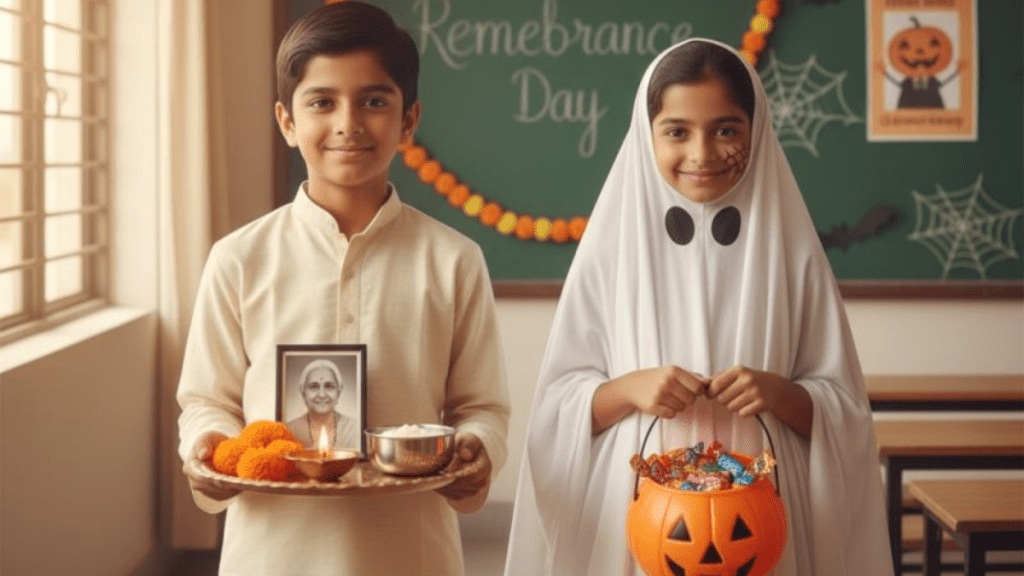A startup founder took to LinkedIn to question the Halloween celebration in schools, and went as far as comparing it with “Shraddh Paksh”, pointing out a cultural double standard in how Western and Indian traditions are perceived. As expected, Pradeep Sharma’s post started a debate on social media, with many criticising him for tying a global holiday to religion. Some even agreed with his perspective.
Startup founder’s post on Halloween sparks debate
“Imagine this. Your child’s school sends a circular saying: ‘Tomorrow we’ll perform Shradha Paksh. Please send a tabeez, some prasad, bhog, and the favourite food of your late ancestor, they might come to eat.’” Sharma wrote on LinkedIn, setting up a hypothetical scenario to illustrate his point.
He added that such a circular would likely alarm parents. The founder and CEO of Teacherfirst[dot]in said that they will panic, and some would even call it “regressive”. “Others would say, ‘This doesn’t belong in schools.’”
Sharma argued that replacing “Shraddh Paksh” with “Halloween” in the same message would suddenly make it appear “modern”, “fun learning”, and a sign of “global exposure”.
“Halloween began over 2,000 years ago as the Celtic festival of Samhain, a ritual to ward off ‘ghosts’ and ‘wandering spirits’ at the end of harvest. People lit bonfires, wore masks to ‘confuse the dead’, and offered food for protection,” Sharma shared about the origins of Halloween.
He also expressed that Western spirit-related traditions are often viewed as “education and fun”, while Indian ones are dismissed as “superstition”.
“Either both are wrong, or both are right. Personally, I don’t believe in spirits; you may, and that’s your choice,” he further said, before stressing that he wants to make a point about schools. “They shouldn’t turn into platforms for trend-following or photo opportunities.”
‘Westernisation is not Modernisation’
The founder said that “Westernisation is not Modernisation”. True modernisation, he wrote, means “thinking, questioning, and choosing with reason, not copying what merely looks global”.
“Our children don’t need another mask to wear. They need the clarity to separate knowledge from trend,” he concluded his post.
He shared a picture along with his post. It shows two children standing side by side – one holding a pooja thali with a photograph of his late grandmother, representing an Indian ritual, and the other holding a Halloween basket filled with candies while dressed in a hijab and costume. Behind them, a green classroom board read “Festival Week” with “Remembrance Day” written below it, seemingly indicating that the image was taken during a school event celebrating multiple cultural traditions.
The green board in the backdrop reads “festival week” with “remembrance day” right below it.
‘Halloween is a holiday, not a religious ritual,’ say LinkedIn users
Sharma’s post, which has clocked over 1.7k reactions and numerous reposts, has also received a flurry of comments. And the reactions are mixed.
Co-founder of Unhotel, Manish Sinha, flocked to the comments section and expressed, “Pretty sure the school is treating it as a fancy dress competition, not some theological summit. One day of kids wearing costumes won’t destroy their critical thinking. What will, though, is when grown-ups storm schools in the name of ‘religion’. We should first try teaching basics in the country, like community living, religious freedom, free thinking, and respect for the law.”
“So you want Shraddh Paksh to become Fun and Trend? They celebrate it collectively; we only worship in silence. It’s a cultural difference,” read another comment from a healthcare advisor and educator.
A third commented, “Why complicate things unnecessarily? Halloween is not the traditional Halloween anymore, and it only caught up traction because of the ‘fun’ factor. You wouldn’t see the same celebration with other ‘Western’ festivals. We do celebrate Diwali, Holi, Navratri, Sankranti, Ganesh Chaturthi, Eid, and so many other festivals that are local to our cultures,” before adding, “Just like Halloween is considered global here, Diwali and Holi are considered exotic and global in the West, and those who celebrate them are also called out by their own conservatives like you. Nothing to do with the BS division you’re trying to create with your post. It’s just exposure to anything outside of our regular culture that has been inspired or taken up from globally trending events will be considered as modern, because ‘globalisation’ is a modern concept in itself.”
The CEO of a startup went on to add, “It’s just fun to dress up and scare people. It’s relatable to kids. Nothing too complicated about it.”
Yet another LinkedIn user said, “You have valid points. But let’s understand a bit more. For us, our rituals are serious business, not fun! We perform Pooja. During Shraadh, we almost do the same things that are done when someone actually passes away in the family. Schools, corporates do celebrate Diwali, Holi, Pongal, and Onam. We do not need to add Shraadh.”
Author Sharon Perera commented, “Halloween is a holiday, not a religious ritual. Let’s not compare personal religious faith with a holiday marked on some calendar in some other country. Let children have some fun!”
However, not everyone slammed him. Some were on board with him on this. “Brilliantly said, Pradeep Sharma. The thin line between Westernisation and Modernisation needs to be taught in the educational institutions,” said one LinkedIn user.
Another added, “Brilliantly said. If we’re handing out candy for one tradition, let’s not call the other one a curse. Cultural literacy should be a two-way street—not a costume party for one and a cautionary tale for the other. Our kids deserve discernment, not just decoration.”
“Born in the 70s, I still can’t digest the noise about ‘Valentine’s day’ in India, and now we have ‘Halloween’ being pushed down our throat,” read a comment from a man who coaches those impacted by layoffs.

